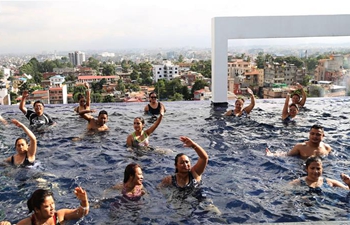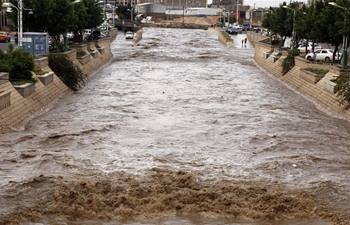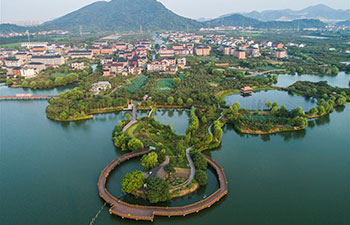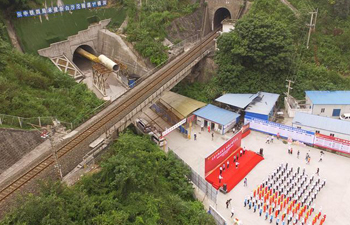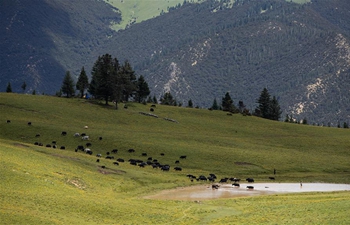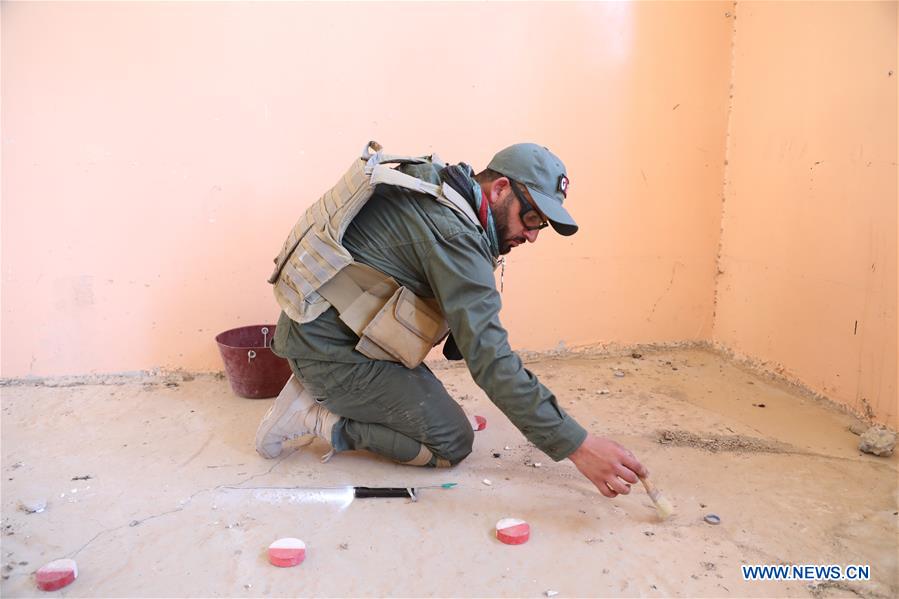
Photo taken on July 4, 2019 shows a man searching for explosive devices in a school on the edges of Sinjar, Iraq. After five years of massive atrocities committed against the Yazidi minority by Islamic State (IS) militants in Sinjar region, explosive remnants from the anti-IS war still pose a threat to civilians' lives in the region. (Xinhua/Khalil Dawood)
by Nabil Salih
SINJAR, Iraq, Aug. 9 (Xinhua) -- After five years of massive atrocities committed against the Yazidi minority by Islamic State (IS) militants in Sinjar region, explosive remnants from the anti-IS war still pose a threat to civilians' lives in the region.
Through a project by the UN Mine Action Service (UNMAS), young men and women from the ravaged Yazidi community have teamed up to take the matter into their own hands and clear explosive hazards from Sinjar and the surrounding villages in the northern province of Nineveh.
TICKET BACK TO NORMAL LIFE
"To be honest, it is a dangerous trade. My mother didn't want me to sign up for the job but I'm the only one with an employment opportunity in the family and supporting them is a priority for me," Seido Khalaf, a resident in Sinjar, told Xinhua.
When the IS rampaged across Sinjar region in 2014, they destroyed the farmhouse of Khalaf's family and forced them into displacement.
"We had to leave for Duhok Province, where we lived in an unfinished structure and then in tents for four years," said Khalaf, now a deputy leader of an explosives clearance team.
In his early 20s, Khalaf has become the breadwinner of a family of eight, with no alternative but to take this dangerous path to forge a new life out of the shadows of war.
With no state support to the local communities returning to Sinjar region, most young people are desperately eking out a living no matter how difficult or threatening the means is.
The UNMAS project is not only a source of livelihood for dozens of unemployed Yazidis, but also their de facto ticket back into a somewhat normal life.
"There are some families who have indeed returned and cultivated their farms after we cleared explosive hazards from roads, schools and houses in the villages around Sinjar," Khalaf noted.
A MOTHER'S LOVE
"I'm not afraid," 24-year-old Fadia Murad told Xinhua when asked about joining the demining efforts.
"I felt happy the first time when I found an explosive device in the area. It was a main charger hidden underneath a shovel," she said.
Murad and her colleagues were working in Ain Tallawi, a rural village on the outskirts of Sinjar. They were clearing explosives from a school which was once used by IS militants as a base.
"It is a dangerous job, but I have no alternative as I need to take care of my sick daughter and pay for her medical checks by the end of the month," Murad said.
In Iraq, many areas are still inundated by improvised explosive devices.
"Difficulties exist, but we work according to standards and take safety measures so there should be no problem," Murad said.
"It's also important for us to serve our country and we're saving people's lives and bringing stability back to the areas," she added.
SAFE ENVIRONMENT FOR RETURNEES
In 2014, Sinjar was overrun by IS militants who killed thousands of Yazidi men, kidnapped their women and forced them into sex slavery as well as recruiting Yazidi children into their ranks.
In the aftermath of liberation, the region was littered with explosive remnants that crippled the return of displaced families and the cultivation of farmlands in Sinjar.
There are two mixed-gender clearance teams, each comprising 14 searchers who all received two months of intensive training by the UNMAS partner G4S, a British multinational security company operating in Iraq.
So far, they have cleared the villages of al-Wardia, Ain Fathi and al-Hatmiyah and some families have started moving back to their homes there.
"The guys are doing a great job. They've found quite a lot of dangerous hazards. Next, the Iraqi army would come to remove what we stockpile and blow them off," Kevin Straker, operations manager for G4S, told Xinhua.
In addition to the two clearance teams, there are two risk education teams tasked with raising public awareness of explosive hazards to displaced people in camps and those who have returned to their towns in the area.
"They're very conscientious. Many of these young people don't have military background, but they've taken this job very well and learned very quickly," Graham Nagel, technical advisor of G4S, told Xinhua.





